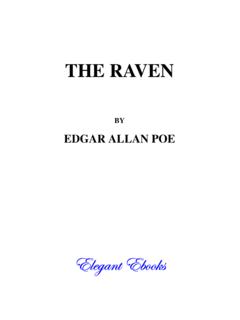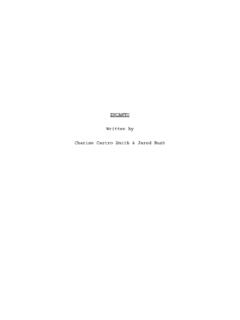Transcription of EXULTET - Cathedral of St. Matthew the Apostle
1 EXULTET EASTER PROCLAMATION. This ancient hymn of praise and blessing is sung at the beginning of the Easter Vigil liturgy and takes its name from the first word of the hymn EXULTET from the Latin ex saltare ( to leap for joy). Its historic origins are difficult to pinpoint. Scholars suggest that its particular musical notation is indicative of chant that was composed perhaps as early as the 5th century, if not before. Others suggest that its origins may date earlier to the 4th century because both St. Ambrose of Milan and St. Augustine refer to it in relation to the Paschal Candle in use during their time. Extant missals used in the Gallican Church of the 7th and 8th centuries contain manuscripts of the hymn. Some of these manuscripts were in the form of rolled parchment that were decorated with illuminations and the portraits of reigning sovereigns of the period.
2 This hymn is typically sung by the deacon. This occurs after the deacon has carried the candle lit by the bishop, leading the way for the procession of the faithful into the darkened church. There is some historical evidence that, in some churches, the deacon has sung it while lighting the Easter Candle, a rather taxing task. Now the rule is to sing it from the ambo next to where the lit Easter Candle is placed in the sanctuary. Its format parallels what we know of as the Preface that begins the Eucharistic Prayer during Mass. The text asks for God's blessing upon the Paschal (Easter) Candle. In that regard, it parallels the blessing of palms and the blessing of water in the baptismal font. The words draw a connection between the Old and the New Testaments, the candle corresponding to the scriptural pillar of fire.
3 One scholar describes its words as language that rises to heights hard to find elsewhere in Christian literature. It outlines ancient church dogmas as through a portal drawing us into the warmth of deep mysticism, to a place where in the light of paradise even the sin of Adam is described as a happy fault.' One unusual aspect of the text is the two-fold mention of the work of the bees, referring to the fact that the candle is to be made from pure beeswax. Another oddity was the prayer's closing reference to the reigning Holy Roman Emperor a practice that ceased in 1870, but was not formally removed from the official text until 1955 when Pope Pius XII reformed the ritual of Holy Week. Of course, the text we hear now is the vernacular English rather than the historic Latin. And the current translation reflects some slight modification resulting from the new translation of the Roman Missal.
4 The Easter Proclamation can be viewed in the illuminated ritual book, located in front of the low ambo (pulpit). The complete text of the Easter Proclamation is on the reverse side of this insert. Deacon Bartholomew Merella EXULTET EASTER PROCLAMATION. Exult, let them exult, the host of heaven, exult, let angel ministers of God exult, let the trumpet of salvation sound aloud our mighty King's triumph! Be glad, let earth be glad as glory floods her, ablaze with light from her eternal King, let all corners of the earth be glad, knowing an end to gloom and darkness . Rejoice, let Mother Church also rejoice, arrayed with the lightning of his glory, let this holy building shake with joy, filled with the mighty voices of the peoples. Therefore, dearest friends, standing in the awesome glory of this holy night, invoke with me, I.
5 Ask you, the mercy of God almighty, that he, who has been pleased to number me, though unworthy, among the Levites, may pour into me his light un-shadowed, that I may sing this candle perfect praises. The Lord be with you. R/ And with your spirit. Lift up your hearts. R/ We lift them up to the Lord. Let us give thanks to the Lord our God. R/ It is right and just. It is truly right and just, with ardent love of mind and heart and with devoted service of our voice, to acclaim our God invisible, the almighty Father, and Jesus Christ, our Lord, his Son, his Only Begotten. Who for our sake paid Adam's debt to the eternal Father, and, pouring out his own dear blood, wiped clean the record of our ancient sinfulness. These, then, are the feasts of Passover, in which is slain the Lamb, the one true Lamb, whose Blood anoints the door-posts of believers.
6 This is the night, when once you led our forebears, Israel's children, from slavery in Egypt and made them pass dry-shod through the Red Sea. This is the night that with a pillar of fire banished the darkness of sin. This is the night that even now, throughout the world, sets Christian believers apart from worldly vices and from the gloom of sin, leading them to grace and joining them to his holy ones. This is the night, when Christ broke the prison bars of death and rose victorious from the underworld. Our birth would have been no gain, had we not been redeemed. O wonder of your humble care for us! O love, O charity beyond all telling, to ransom a slave you gave away your Son! O truly necessary sin of Adam, destroyed completely by the death of Christ! O happy fault that earned so great, so glorious a Redeemer!
7 O truly blessed night, worthy alone to know the time and hour when Christ rose from the underworld! This is the night of which it is written: the night shall be as bright as day, dazzling is the night for me, and full of gladness. The sanctifying power of this night dispels wickedness, washes faults away, restores innocence to the fallen, and joy to mourners, drives out hatred, fosters concord, and brings down the mighty. On this night of grace, O holy Father, accept this candle, a solemn offering, the work of bees and of your servants' hands, an evening sacrifice of praise, this gift from your most holy Church. But now we know the praises of this pillar, which glowing fire ignites for God's honor, a fire into many flames divided, yet never dimmed by sharing of its light, for it is fed by melting wax, drawn our by mother bees to build a torch so precious.
8 O truly blessed night, when things of heaven are wed to those of earth, and divine to the human. Therefore, O Lord, we pray you that this candle, hallowed to the honor of your name, may persevere undimmed, to overcome the darkness of this night. Receive it as a pleasing fragrance, and let it mingle with the lights of heaven. May this flame be found still burning by the Morning Star: the one Morning Star who never sets, Christ your Son, who coming back from death's domain, has shed his peaceful light on humanity, and lives and reigns for ever and ever. R/ Am




